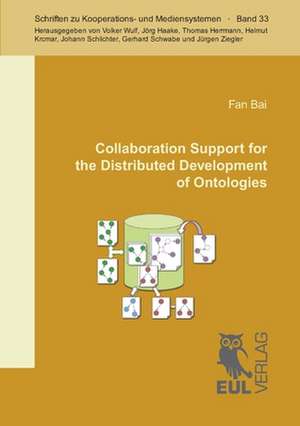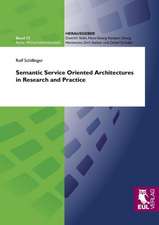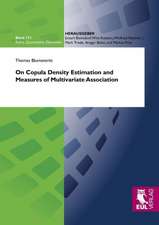Collaboration Support for the Distributed Development of Ontologies: Schriften zu Kooperations- und Mediensystemen, Bd. 33
Autor Fan Baien Limba Engleză Paperback – 27 feb 2013
Preț: 417.98 lei
Nou
Puncte Express: 627
Preț estimativ în valută:
79.98€ • 83.72$ • 66.57£
79.98€ • 83.72$ • 66.57£
Carte disponibilă
Livrare economică 10-24 martie
Preluare comenzi: 021 569.72.76
Specificații
ISBN-13: 9783844102284
ISBN-10: 3844102280
Pagini: 140
Dimensiuni: 148 x 210 x 9 mm
Greutate: 0.18 kg
Editura: Josef Eul Verlag GmbH
Colecția Schriften zu Kooperations- und Mediensystemen, Bd. 33
Seria Schriften zu Kooperations- und Mediensystemen, Bd. 33
ISBN-10: 3844102280
Pagini: 140
Dimensiuni: 148 x 210 x 9 mm
Greutate: 0.18 kg
Editura: Josef Eul Verlag GmbH
Colecția Schriften zu Kooperations- und Mediensystemen, Bd. 33
Seria Schriften zu Kooperations- und Mediensystemen, Bd. 33
Cuprins
1 Introduction1.1 Definition and Brief History of the Term Ontology1.2 Collaborative Ontology Development1.3 Goals and Structure of the Dissertation2 Collaborative Ontology Development Methodologies and Tools2.1 Overview of Ontology Engineering2.2 Introduction of Representative Methodologies2.3 Tool Supported Collaborative Ontology Development2.4 Comparing Ontologies3 Requirements for Collaborative Ontology Development3.1 Collaboration Requirements3.2 Administrative Requirements4 Collaborative Ontology Development - the Ontoverse Use Case4.1 Overview of the Ontoverse Project4.2 User Communities4.3 Ontology Life Cycle within the Platform4.4 Important Project Results5 An Ontology Editor with Novel Cooperation and Visualization Functions5.1 Challenges in Developing the Editor5.2 Scenario: Collaborative Ontology Development in the Ontoverse Editor5.3 The Backend of the Editor5.4 New Visualization Components for Ontology Editing5.5 Some Points Learned from the Project6 A Resource-Level Versioning Mechanism for Ontology Editing6.1 Motivation6.2 A Brief Introduction of Some Vocabularies6.3 Challenges in Providing Versioning Support6.4 Theoretical Foundation of the System6.5 Prototype System and Use Case for Ontology Versioning7 Architecture and Implementation7.1 Collaborative Ontology Development Environment - Ontoverse Editor7.2 Versioning Support for Editors8 Evaluation and Conclusions8.1 Initial Evaluation of the Version Control System8.2 Conclusions and Future Work
















